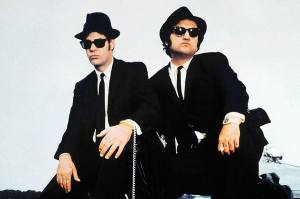There have been claims that Rocketman, the biopic of Elton John, is ‘cheesy’ and ‘clichéd’, but, in truth, you do want these films to be a bit cheesy and clichéd. (In Bohemian Rhapsody if a record executive had never cried: ‘Nobody wants to listen to a six-minute opera song with words like “Galileo” in it!’ I’d have walked away in a huff.) So I’m fine with that — would you want a musical biopic without a montage of concert dates and newspaper headlines whirling past? — plus this is more than just that, as it’s also a fun, visually dazzling, extravagantly camp romp. And while the script is, generally, platitudinous, it still has its moments. ‘I started acting like a cunt in 1975,’ says Elton at one point. ‘And just forgot to stop.’
The film is directed by Dexter Fletcher (who took over Bohemian Rhapsody after Bryan Singer was fired), scripted by Lee Hall (Billy Elliot) and stars Taron Egerton, who is sublime. He captures the Elton-ness of Elton without ever resorting to mimicry, and he does his own singing which, astonishingly, also captures the Elton-ness of Elton. The film opens in the 1980s with Elton in rehab undergoing group therapy. You can tell which one is Elton as he is attired in a flame-orange bodysuit and wings and devil horns and massive platforms and glittery heart-shaped sunglasses. He confesses to being an alcoholic. And a cocaine addict. And a bulimic. And a shopaholic. ‘What was your childhood like?’ asks the therapist, helpfully.
So we spool back to Pinner in the 1950s and dive into the first of several big musical production numbers. (It is quite Mamma Mia-ish in this respect.) Here, we have little Reginald Dwight dancing round his neighborhood singing ‘The Bitch is Back’. Sometimes, the songs bear no obvious relation to the narrative, but I wouldn’t worry about it. Sometimes, the songs bear too much relation to the narrative — as when his whole family sing ‘I Want Love’ — but I wouldn’t worry about that either. Just enjoy the songs. Certainly, Elton wants love but does not receive it as his mother (a strangely stilted Bryce Dallas Howard) and father (Steven Mackintosh) appear incapable of giving it. Still, there is a battered old piano in the front room so will he suddenly sit down and display how naturally gifted he is? Will he? Will he? Yes! And now we’re off.
So it’s Saturdays as a scholarship student at the Royal Academy of Music, discovering rock’n’roll, changing his name, experiencing his first gay kiss, fortuitously meeting Bernie Taupin (Jamie Bell), and also meeting John Reid (Richard Madden), who will become his lover and manager. Reid was, if memory serves right, portrayed as a good egg in Bohemian Rhapsody (he also managed Queen) but he is monstrously cruel and hateful here. The truth probably lies somewhere in between, but films such as this don’t have much truck for the ‘in between.’ You’re a black hat or a white hat and that’s that. (Mum and dad are black hats. Taupin is a white hat. Etc.)
This is your standard fame-drugs-redemption scenario, which doesn’t tell us much about the work or the artistic process. It is far more interested in the increasing outrageousness of the costumes as well as the highly stylized, fantastical showpieces that may show Elton meeting little Reggie at the bottom of a swimming pool. Such scenes are visually inventive, but can feel repetitive if they don’t advance the story in any way, which some of them don’t. As for the pop psychology, well, that is laid on thick, with all the characters at various times sounding like self-help books. ‘You’ve got to kill the person you were born to be to become the person you want to be,’ is a typical example.
But this has energy and that terrific central performance and ‘Pinball Wizard’ and also that montage of newspaper headlines whirling past. So what more could you want? Seriously?
This article was originally published in The Spectator magazine.


















